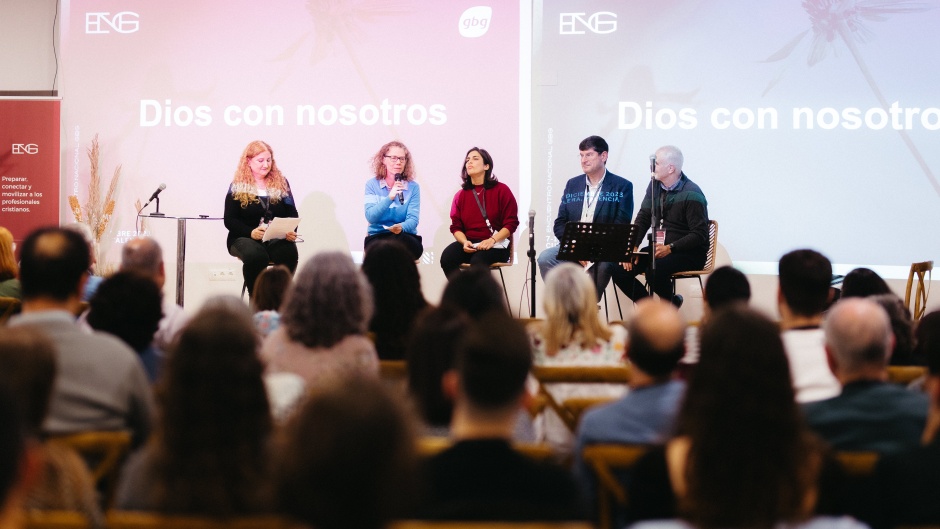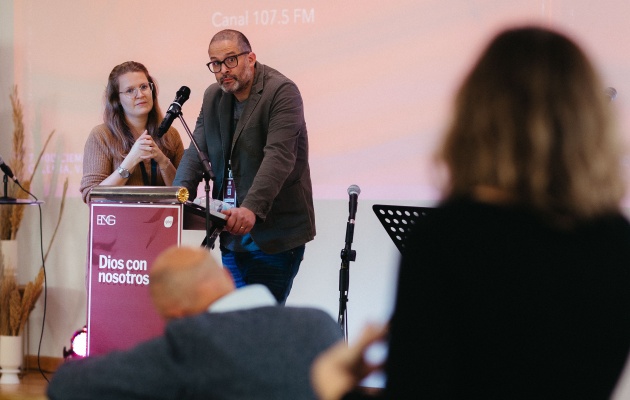Professionals in Spain reflected on how to be “magnetic for Jesus” in the workplace
Over 300 Christian graduates and professionals from all backgrounds came together to listen to Dan Strange and other speakers on the theme of how to turn all spheres of life into an act of worship to God.
CULLERA (SPAIN) · 21 DECEMBER 2023 · 11:40 CET

Worshiping the God of all and in all of life; worshiping together and under pressure; worshiping in failures and in contentment; and, worshiping God in the midst of culture with a magnetic faith, were some of the challenges more than 300 Christian professionals had the opportunity to hear during the weekend of 7-10 December at the 2023 National Graduates Gathering.
Under the title "God with us" and in the Valencian city of Cullera (Spain), participants were encouraged to turn all spheres of life into an act of worship to God, taking into account the divine attributes of greatness, mercy and justice.
It is necessary to recover a magnetic faith in Christ, giving answers to the questions that every human being questions, within a disenchanted and secularised culture.
Students and leaders, economists and managers, psychologists and teachers, Christians in science, doctors and nurses, communicators and artists, as well as many other national and foreign professionals discussed how to bring Christ to our work and our work to Christ, how to eliminate haste, how to start preparing for retirement, or how to care for Christian professionals in the church.
Cropped.jpg)
Over 300 Christian professionals and graduates attedned the conference, in Cullera. / Photo: GBU España Worshipping the God of all in all of life
Worship is a global fact that encompasses the totality of existence, it is a full-time worship, considered Carmen Arenas, early childhood education teacher and graduate in Theology at IBSTE, in the first biblical exposition. In the Samaritan woman's encounter with Jesus, she asked him how we should worship. And King David, in Psalm 145, answers that question, for God, who alone is worthy of worship, and his name is to be blessed in a personal, character-centred and divine way.
The psalmist's main motive is not personal circumstances, but to continue to know God's greatness, mercy and justice. The Bible offers the records of His mighty acts related to humanity. God is not only Creator, but He loves what He creates, so His mercy is for all, for He rains down on the just and the unjust. This Psalm also speaks of singing of His everlasting righteousness which involves no fear.
And, although the name of Christ does not appear directly in this text, Carmen Arenas challenged professionals not to live as functional atheists, but to make the invisible God real and at the centre of our daily work. She further affirmed that worship is not limited to an act in church, but is about making our life an act of worship in itself.
Cropped.jpg)
Esteban Rodemann, preaching at GBG 2023. / Photo: GBU España For his part, Bible teacher Esteban Rodemann - BA in History and MA in Theology, considered the need to worship God in all of life, and to bless the Lord at all times, as King David did in Psalm 34.
We live in an anti-God world surrounded by sickness, dangers, dramatic situations, as if we were in a pressure cooker, yet God takes care of us and invites us to trust in Him. Rodemann analysed the obvious connection of this Psalm with Jesus Christ and how the divine support should push us to sharpen our hearts in tune with Christ, to walk clean and open our mouths crying out to the Lord, as well as to anticipate the triumph of justice. The president of NGO Alianza Solidaria, Francisca Capa, closed the first day of biblical exposition of these two psalms with a mention of worship from Revelation 5:12-13 and affirmed that worship is the only thing that transcends for eternity, since here on earth we are rehearsing worship for when we are in heaven, in the presence of the Lord.
And, "how can we be content with what is happening in the world?" was the question posed by psychiatrist and writer, Pablo Martinez, at the start of the second day of Bible exposition. The 100th Psalm of communal worship is an authentic reflection of the relationship God wants us to have with Him as human beings. Worship, then, has three vertices in a triangle. On the one hand, the believer and all God's people always sing because they cannot hide what is in their hearts.
Furthermore, worship of the Lord has to be with joy and love, not out of routine. Finally, we must recognise and know that He created us, that He is sovereign and our shepherd. Ultimately, we are privileged to be God's created Poem (Eph.2:10), and nothing happens by chance, hence the responsibility to obey Him from the heart.
Cropped.jpg)
With Psalm 16 and under the heading "Worshipping in contentment", Rodemann revisited the scenario of a broken world, full of thorns and thistles, where we see that life is a problem in itself. However, there is a glorious goal, there is a divine defence along the way and there are decisions to be made and, when the Lord says "thy kingdom come" he is confirming that he will not leave us as helpless lambs in the herd, but will crush the head of the serpent as God promised from the beginning. To conclude this day of exposition, the attendees composed three verses of personal character as a prayer of worship to God.
And on the third day of the worship presentation, Pablo Martínez analysed Psalm 51, "Worshipping in failures" and reminded us of the need to "unload the backpack" of forgiveness, because we feel the double consciousness of sin against heaven and against another person we offend. When we do unworthy acts, we do not only harm our neighbour, but also God; it is not the harm we do, but the good we fail to do. And we are not sinners because we sin, but we sin because we are already sinners. Woundedness requires healing and sin needs forgiveness. Thus, it is essential that the fallen feel the restoration of God and of other Christians, so as to arrive at a humble-hearted worship, since no kind of praise is superior to that of a contrite and humbled heart, Martinez said.
The climax of this exposition on the Psalms was given by Carmen Arenas with 143, "Worshipping under pressure", where she confirmed that we need to verbalise the pain we carry inside and God tells us that He is always there, always responding. Remembering ancient deeds helps us to see the hope, mercy and power of God. And we can be sure that God is our high priest who can give us timely succour. Carmen Arenas ended by encouraging the audience to be of help to all those around us.
Cropped.jpg)
Loving God in the midst of culture: a magnetic faith
Christians should clearly articulate how the Bible explains the rest of the stories because, if we don't, the rest of the stories will step in to tell the Bible in their own way, said Dan Strange, director of Crosslands Forum in the UK, in the first plenary on magnetic presuppositions. As the author of the books Plugged In and Making Faith Magnetic, during the days of this National Gathering he presented how to worship God in the midst of culture.
We live in a society with a "differently enchanted" culture, in which "mixer" people try to rewrite the script of how the human being and the universe work. God never hides, even though it sometimes looks like a game of cosmic hide-and-seek. People cannot eradicate the religious impulse within themselves, Strange continued, and even if people do not recognise it, they are aware of their relationship and responsibility to the true and living God. Belonging to something bigger than oneself, abiding by the norm as a way of life, longing for liberation from a broken world, thinking of destiny as a way of being in control, or of higher power, are the magnetic points that Dan Strange sees as leading again and again to religious thinking.
The message that confronts, connects or has a "subversive fulfilment" is the gospel itself. Jesus is the way to connect, to live, the way out, the one in control and the way to the afterlife.

And, the purpose of these plenaries in which the cultural context of Spain was discussed with group sharing, was to consider how to become fully magnetic professionals and people: loving Jesus and our identity in Christ, loving His Church, creating spaces where we "de-magnetise" and "re-magnetise" for Christ.
Some chose this speaker again to listen to the seminar on "bringing Christ to our work and our work to Christ". There were several considerations in this conference: seeing the breadth of the gospel and seeing it as a widening lens, considering the cultural mandate and the great commission, among other aspects.
To bring the work to Christ is to consider Christ's right to be Lord of all and to take captive every thought into submission to Christ. And finally, to bring Christ into your work you need to consider the magnetic points of wholeness, norm, liberation, destiny and higher power to understand that co-workers are equally religious, even if they do not have God at the centre. Other topics of the seminars were: eliminating the rush, starting to prepare for retirement or how to care for Christian professionals in the church.
For their part, the professional groups of Nursing, Medicine, Law, Teachers, Psychologist, Entrepreneurs, or, Christians in Science discussed in their spaces the topics concerning common situations in their professions.
In addition to all this, on the first day of the Meeting there was the possibility to discuss in a round table the commitment of the GBU with the Church, through the answers of the directors of the different theological seminaries: UEBE, FIEIDE, Assemblies of God and IBSTE.
High school youth and children also had their teaching space and the bookstore area was filled with interest in literature related to the topics presented to challenge professionals to be better worshippers and to be part of the re-magnetisation in Spanish culture.
The auditorium was set for the next National Meeting in December 2024, where the psychiatrist Pablo Martinez will speak on the theme of the family.
One more year
Learn all about our #OneMoreYearEF campaign here (English).
Published in: Evangelical Focus - europe - Professionals in Spain reflected on how to be “magnetic for Jesus” in the workplace
